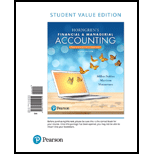
Concept explainers
(1)
Accounts receivable refers to the amounts to be received within a short period from customers upon the sale of goods and services on account. In other words, accounts receivable are amounts customers owe to the business. Accounts receivable is an asset of a business.
Bad debt expense:
Bad debt expense is an expense account. The amounts of loss incurred from extending credit to the customers are recorded as bad debt expense. In other words, the estimated uncollectible accounts receivable are known as bad debt expense.
Allowance method:
It is a method for accounting bad debt expense, where uncollectible accounts receivables are estimated and recorded at the end of particular period. Under this method,
Direct write-off method:
Under this method, accounts would be written off only when it is determined that the receivables from a customer remain uncollectible.
Write-off:
Write-off refers to deduction of a certain amount from accounts receivable, when it becomes uncollectible.
To journalize: The September month transactions using allowance method.
(2)
To journalize: The September month transactions using direct-write off method.
(3)
To Show: The amount of bad debts expense that will be reported on the income statement under each of the two methods, and describe which amount best matches expenses with revenue.
(4)
To identify: The amount that would be reported as net accounts receivable on the
Trending nowThis is a popular solution!

Chapter 8 Solutions
Horngren's Financial & Managerial Accounting, The Financial Chapters, Student Value Edition Plus MyLab Accounting with Pearson eText -- Access Card Package (6th Edition)
- its net income?arrow_forwardSilver Star Manufacturing has $20 million in sales, an ROE of 15%, and a total assets turnover of 5 times. Common equity on the firm's balance sheet is 30% of its total assets. What is its net income? Round the answer to the nearest cent.arrow_forwardHi expert please give me answer general accounting questionarrow_forward
- Horizon Consulting started the year with total assets of $80,000 and total liabilities of $30,000. During the year, the business recorded $65,000 in service revenues and $40,000 in expenses. Additionally, Horizon issued $12,000 in stock and paid $18,000 in dividends. By how much did stockholders' equity change from the beginning of the year to the end of the year?arrow_forwardх chat gpt - Sea Content Content × CengageNOW × Wallet X takesssignment/takeAssignmentMax.co?muckers&takeAssignment Session Loca agenow.com Instructions Labels and Amount Descriptions Income Statement Instructions A-One Travel Service is owned and operated by Kate Duffner. The revenues and expenses of A-One Travel Service Accounts (revenue and expense items) < Fees earned Office expense Miscellaneous expense Wages expense Required! $1,480,000 350,000 36,000 875,000 Prepare an income statement for the year ended August 31, 2016 Labels and Amount Descriptions Labels Expenses For the Year Ended August 31, 20Y6 Check My Work All work saved.arrow_forwardEvergreen Corp. began the year with stockholders' equity of $350,000. During the year, the company recorded revenues of $500,000 and expenses of $320,000. The company also paid dividends of $30,000. What was Evergreen Corp.'s stockholders' equity at the end of the year?arrow_forward
- Evergreen corp.'s stockholders' equity at the end of the yeararrow_forwardHarrison Corp. reported earnings per share (EPS) of $15 in 2022 and paid dividends of $4 per share. The current market price per share is $90, and the book value per share is $65. What is Harrison Corp.'s price- earnings ratio (P/E ratio)?arrow_forwardEverest Manufacturing produces and sells a single product. The company has provided its contribution format income statement for March: • Sales (4,500 units): $135,000 • Variable expenses: $58,500 • Contribution margin: $76,500 • Fixed expenses: $50,000 • Net operating income: $26,500 If the company sells 5,200 units, what is the total contribution margin?arrow_forward

 AccountingAccountingISBN:9781337272094Author:WARREN, Carl S., Reeve, James M., Duchac, Jonathan E.Publisher:Cengage Learning,
AccountingAccountingISBN:9781337272094Author:WARREN, Carl S., Reeve, James M., Duchac, Jonathan E.Publisher:Cengage Learning, Accounting Information SystemsAccountingISBN:9781337619202Author:Hall, James A.Publisher:Cengage Learning,
Accounting Information SystemsAccountingISBN:9781337619202Author:Hall, James A.Publisher:Cengage Learning, Horngren's Cost Accounting: A Managerial Emphasis...AccountingISBN:9780134475585Author:Srikant M. Datar, Madhav V. RajanPublisher:PEARSON
Horngren's Cost Accounting: A Managerial Emphasis...AccountingISBN:9780134475585Author:Srikant M. Datar, Madhav V. RajanPublisher:PEARSON Intermediate AccountingAccountingISBN:9781259722660Author:J. David Spiceland, Mark W. Nelson, Wayne M ThomasPublisher:McGraw-Hill Education
Intermediate AccountingAccountingISBN:9781259722660Author:J. David Spiceland, Mark W. Nelson, Wayne M ThomasPublisher:McGraw-Hill Education Financial and Managerial AccountingAccountingISBN:9781259726705Author:John J Wild, Ken W. Shaw, Barbara Chiappetta Fundamental Accounting PrinciplesPublisher:McGraw-Hill Education
Financial and Managerial AccountingAccountingISBN:9781259726705Author:John J Wild, Ken W. Shaw, Barbara Chiappetta Fundamental Accounting PrinciplesPublisher:McGraw-Hill Education





